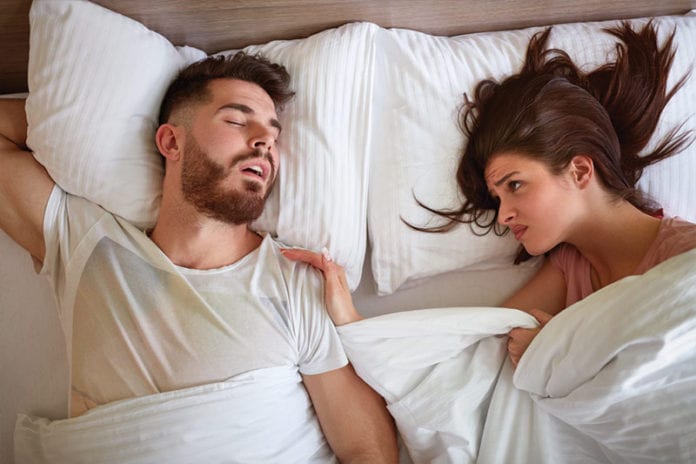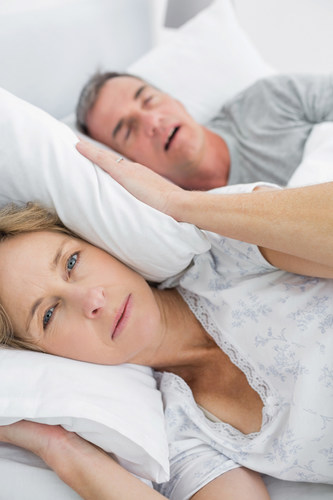For many people, snoring makes a night of restful sleep a far-off dream. The noisy interruptions may even have a detrimental effect on relationships and health.
More than a quarter of Americans say that a snoring bed partner makes them annoyed or angry, according to a recent survey from the American Academy of Dental Sleep Medicine (AADSM). Forty percent of women also claim snoring in the opposite sex is a turnoff, and nearly one in 10 Americans went so far as to admit that snoring has hurt at least one of their romantic relationships. One in five says that a snoring partner could even drive them out of bed.
Beyond the bedroom
In addition to pushing couples to sleep apart, snoring can cause health worries. Snoring is a tell-tale sign of obstructive sleep apnea, a potentially life-threatening condition that causes sufferers to stop breathing repeatedly during sleep for anywhere from a few seconds to more than a minute. If left untreated, sleep apnea can increase the risk for serious health problems from congestive heart failure to diabetes and depression.
"Because it can be embarrassing, snoring can often be the elephant in the room when it comes to addressing relationship frustrations and health concerns," said Kathleen Bennett, D.D.S., president of the AADSM. "But it's important that your significant other is made aware of their snoring – and the effects it has on you, your relationship and their personal health – so they can begin taking steps to remedy it."
Seeking treatment
There are several treatment options for sleep apnea, according to AADSM experts. It is important to speak with a physician to determine which option is best for you.
The first line of treatment for sleep apnea is continuous positive airway pressure (CPAP) therapy. But according to the AADSM, up to 50 percent of sleep apnea patients do not comply with or tolerate this form of treatment.
"Sleep apnea is traditionally treated with a CPAP machine, which includes a constantly running motor, tubing and a face mask. It's a great treatment, but it's not the only option," said Dr. Bennett. "Many people are surprised to learn that dentists can help treat sleep apnea with an oral appliance, a device similar to an orthodontic retainer, that's effective, less cumbersome and more discreet."
Oral appliance therapy uses a small mouth guard-like device worn only during sleep to maintain an open, unobstructed airway, making it a sleeker, more attractive treatment option for many sleep apnea sufferers. An oral appliance prevents the airway from collapsing by supporting the jaw in a forward position. The devices, which are a proven and effective sleep apnea treatment, also come with the perks of being silent, portable and simple to care for. A patient first must be diagnosed with snoring or sleep apnea by a physician. Then a dentist can examine the diagnosed patient and provide a custom-made oral appliance, which is covered by many medical insurance plans.
Additionally, upper airway surgery is a potential treatment for some patients. A detailed examination of the entire upper airway is necessary before your doctor can decide if you are a candidate for surgery.
If you or your significant other suffers from sleep apnea or loud and frequent snoring, visit www.LocalSleepDentist.com to learn more and find a dentist in your area who can help.



